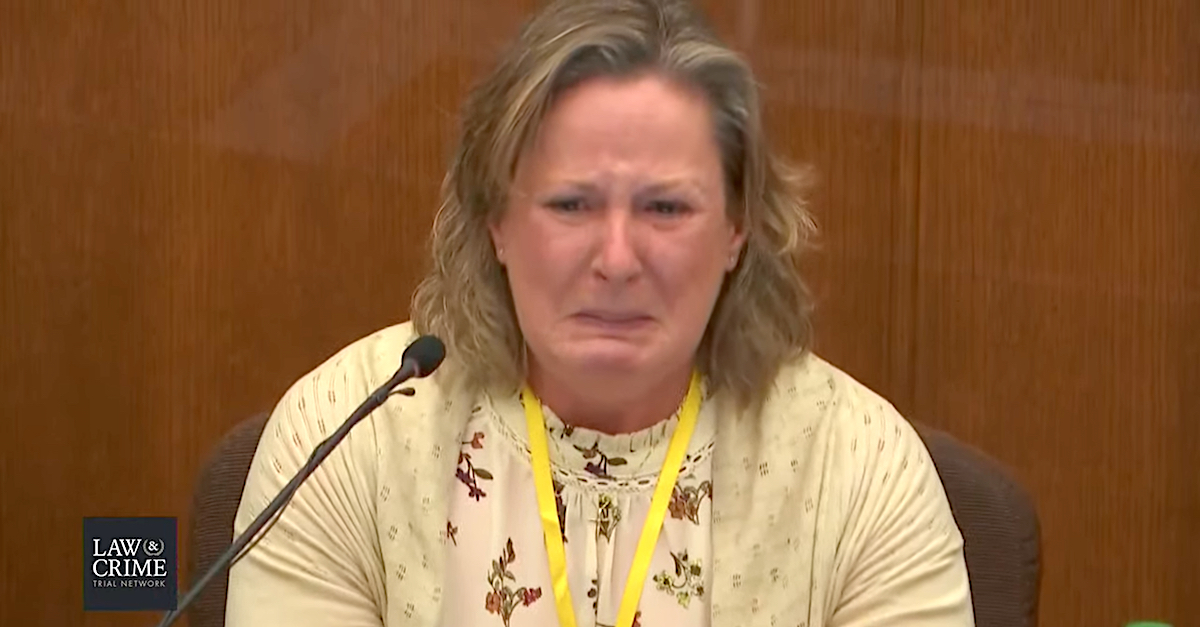
Former Brooklyn Center police officer Kimberly Potter cries on the witness stand on Dec. 17, 2021. (Image via the Law&Crime Network.)
Kimberly Potter, the since-resigned Minnesota police officer on trial for shooting and killing Daunte Wright, wept on the witness stand when asked by her attorney to recount the events leading up to and surrounding Wright’s death.
In direct testimony that lasted less than an hour, Potter initially downplayed the severity of the warrant that necessitated Wright’s arrest. The testimony contrasted with an attempt by one of her defense attorneys to bombastically stress the seriousness of the warrant during opening statements.
Potter described the warrant that had been issued by a judge for Wright’s arrest as a “petty misdemeanor” warrant.
Later, she described it in similar terms.
“It wasn’t a bad warrant,” Potter said of the severity of the judicial decree. “It was just a regular petty warrant.”
Still, Potter said a “second” officer was necessary for the arrest. Potter was working with officer Anthony Luckey, who was in training and who she described as a mere probationary employee. So, she and Luckey called Sgt. Mychal Johnson to the scene to help take Wright into custody.
Despite downplaying the warrant, Potter testified that she considered any vehicle stop to be a “dangerous” situation because weapons were sometimes kept in vehicles and because subjects in stopped vehicles were sometimes uncooperative.
The officer-turned-defendant said Wright’s data in law enforcement databases suggested a weapons violation — which heightened her concerns about the encounter.
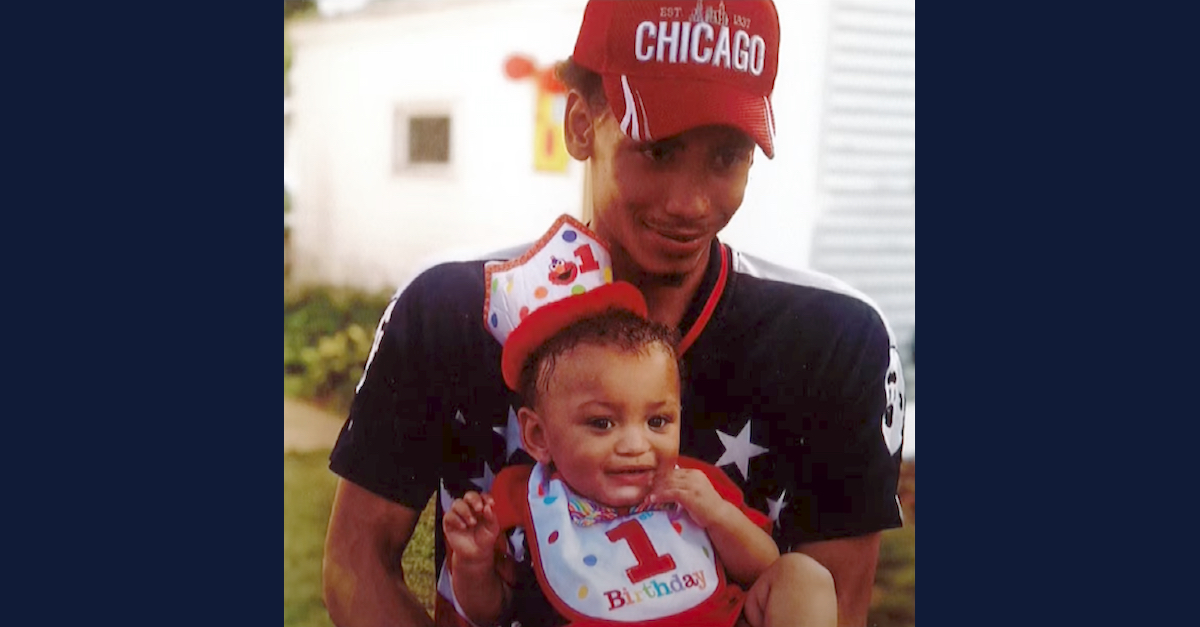
Prosecutors showed an image of police shooting victim Daute Wright during opening statements in the trial of ex-Brooklyn Center, Minn. Officer Kimberly Potter on Dec. 8, 2021. (Image via a slide used during prosecution opening statements.)
Potter said Luckey chose to stop Wright because Wright was driving a vehicle which displayed expired “tabs” — registrations attached to Minnesota license plates — and because an air freshener was hanging from the vehicle’s rear-view mirror.
Potter she would “most likely” have “not stopped Wright’s car had she been patrolling alone. She said the Department of Motor Vehicles had been slow to circulate appropriate license plate tabs during the pandemic and that officers were giving many motorists with expired registrations a pass because of the known delays.
Prosecutors objected to the question because it called for Potter to speculate. The judge allowed it anyway.
Besides the weapons offenses, Potter testified that Luckey, who first approached Wright, reported that “there was an obvious smell of marijuana and some seedlings or shake residue on the center console inside the vehicle.” That also escalated the situation, she suggested.
Potter became emotional when asked how she and Sgt. Johnson attempted to take Wright into custody. Wright struggled. Johnson’s hand was in the car; he was attempting to manipulate Wright’s gear shift to prevent him from taking off, Potter testified.
The look on Johnson’s face terrified Potter, she told the jury.
“He had a look of fear on his face,” the defendant told the jury after referencing Johnson. “It’s nothing I’d seen before.”
“We were struggling,” she continued. “We were trying to keep him from driving away. It just went — it just went chaotic.”
“And then, I remember yelling ‘Taser, Taser, Taser,’ and nothing happened,” she continued. “And then, he told me I shot him.”
Potter broke down on the witness stand and put both hands over her face while recalling the events. She said she didn’t recall the rest of what occurred. She only could remember being in an ambulance and, eventually, being back the police station.
“I don’t remember a lot of things afterwards,” Potter told the jury.
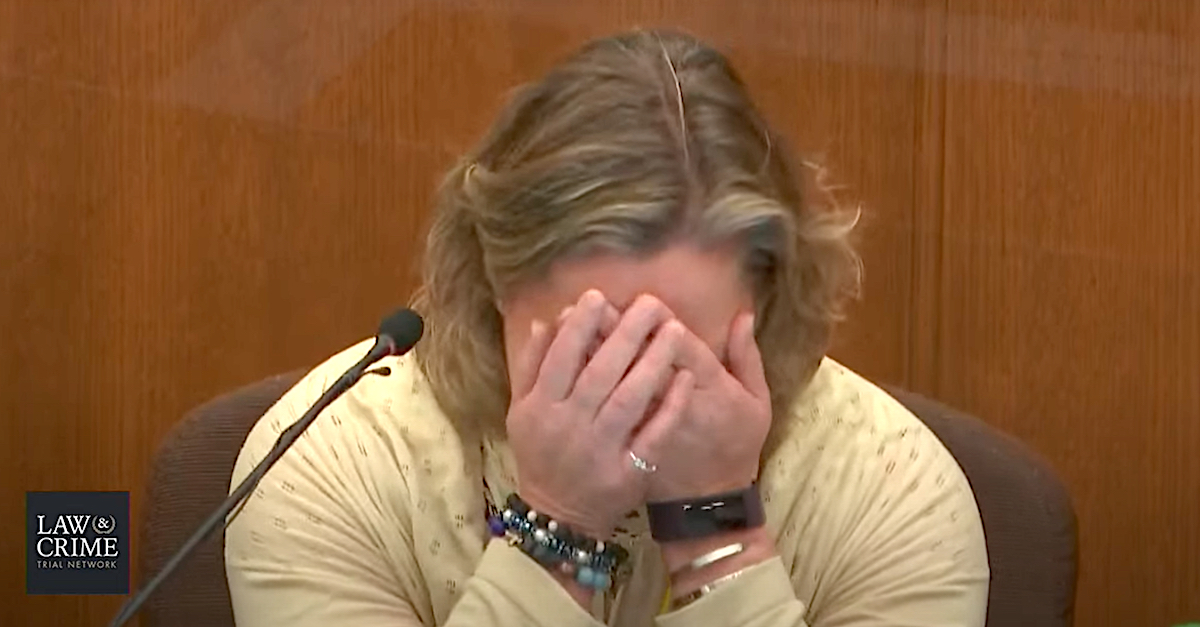
Former Brooklyn Center police officer Kimberly Potter cries on the witness stand on Dec. 17, 2021. (Image via the Law&Crime Network.)
Potter’s body camera showed more of the story which she claims to have forgotten. According to the video, Potter said, “Holy shit! I just shot him!” after her gunshot rang out.
“I grabbed the wrong fucking gun!” Potter continued. “I shot him! Oh, my God! Oh, my God! Oh, my God! Oh, my God!”
Another officer told Potter to sit down as she wailed uncontrollably in the video.
“Are you okay?” the officer said. “Just breathe; just breathe.”
Potter continued to scream and cry in agony.
“Kim, that guy was trying to take off with me in the car,” someone else — presumably Johnson — said in immediate defense of Potter’s actions.
According to the video, Potter also suggested she would go to prison for what occurred. She testified that she did not remember uttering that self-damning statement.
“Do you remember saying something about prison?” asked Potter’s defense attorney.
“No,” Potter responded.
“If you did say that, do you have an idea now why you would say that?” he implored. “Was the climate back then about police officers a little rough?”
The defense attorney appeared to be referencing the nearby trial of Derek Chauvin, the Minneapolis police officer since convicted of murdering George Floyd, Jr. The Chauvin trial commenced on March 8 and concluded on April 20. Potter shot and killed Wright in the middle of that proceeding on April 11.
Prosecutors objected to the question, and the judge agreed to sustain the objection.
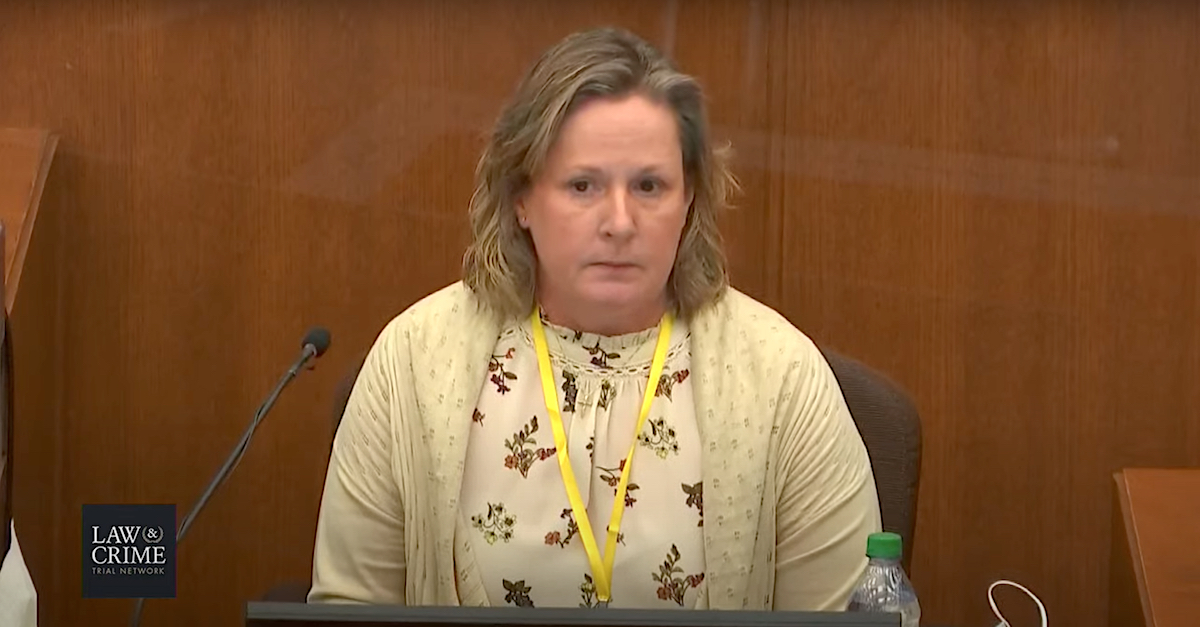
Kimberly Potter responds to questions from her own attorney during testimony on Dec. 17, 2021. (Image via the Law&Crime Network.)
“So much of it is missing,” Potter said of her memories of the shooting. She said she has been in therapy since then.
Potter testified that she quit her job “a day or two after the incident” because “there was so much bad things happening.” She said she didn’t want “bad things” to happen to her colleagues or to the city of Brooklyn Center, where she was employed on the police force. She said she sold her Minneapolis-area home and moved out of the State of Minnesota after leaving the force.
Earlier in her testimony, Potter said she previously carried the casket of an officer who was killed during a traffic stop. She said she never received complaints about her work on the streets and did not recall ever having deployed her Taser or her gun while in the field.
In her 26 years as a police officer, #KimPotter said on Friday that she never used her Taser or fired her gun — until she shot Daunte Wright. @LawCrimeNetwork pic.twitter.com/zSBK3pxKbB
— Law&Crime Network (@LawCrimeNetwork) December 17, 2021
She at one point said her Taser looked and handled a lot like a gun — a point the state sought to refute during its case in chief and, concomitantly, on cross examination.
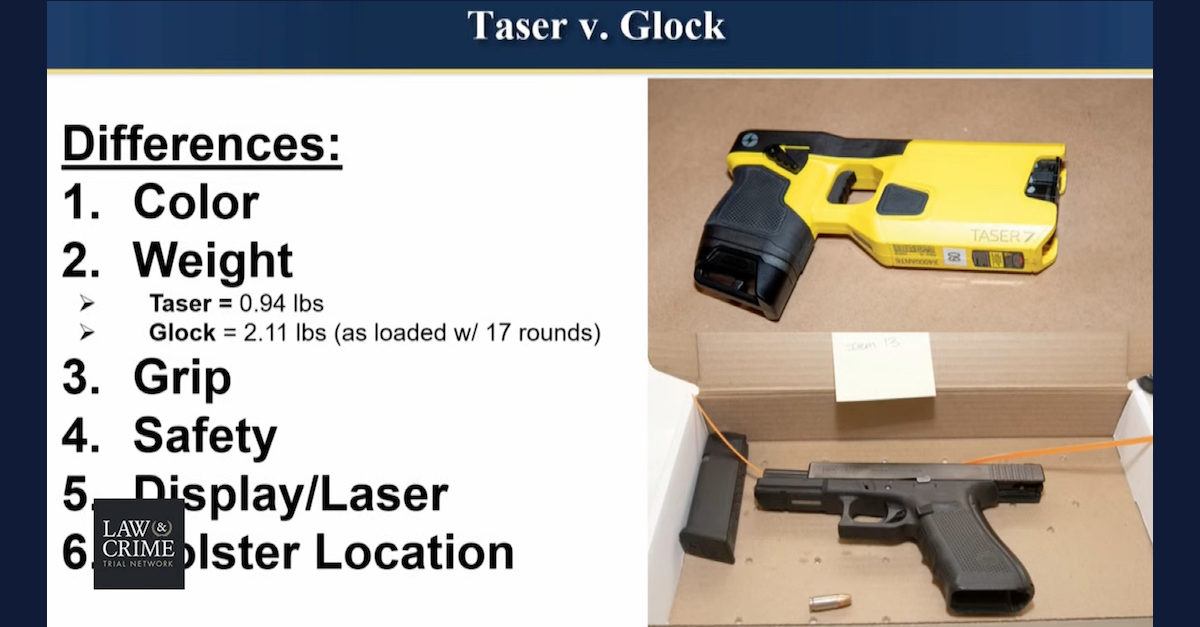
A slide presented by prosecutors during opening statements walked jurors through the differences between Kimberly Potter’s taser and her service firearm. (Image via a slide used during prosecution opening statements.)
Potter said she decided to become a police officer after interacting with other officers in her formative years.
“The police are good people,” she said she came to believe.
During cross, prosecutors noted that the Taser “weighed half as much” as the loaded Glock and was clearly a different color. They questioned Potter about the decision to stop Wright and what she and Luckey discussed while examining Wright’s warrant.
Potter confirmed that she never saw Wright with a gun. Wright never threw a punch, never tried to kick the officers, and never threatened harm to the officers, Potter confirmed when asked by prosecutors.
Prosecutors then chided Potter’s decision to look into a ex-parte temporary order of protection a female had obtained against Wright. (Ex parte orders are obtained by only one party without the other party’s presence.) When the order popped up in Wright’s records, Potter said the police wanted to confirm that the woman who was a passenger in Wright’s car was not in harm’s way.
Prosecutors downplayed the order by noting that it did not “prohibit all contact with all members of the opposite sex.”
“Just having a female passenger in your car, is not . . . a violation of an OFP?” the prosecutor asked Potter.
“It has to be investigated,” Potter responded.
“And you didn’t see a need to rush up to the passenger side of the vehicle and pull this woman to safety?” the prosecutor continued.
“Not at the moment,” Potter said while describing her thoughts and actions at the time.
Prosecutors also walked Potter through body camera video that shows her switch a piece of paper from one hand to the other seconds before she shot Wright. Tracking the movements is critical, prosecutors suggested, because Potter yelled out that had drawn her Taser from her left hip when she actually drew her gun from her right.Potter kept her gun on the right side of her service belt and her Taser on the left side. Potter is right-handed.
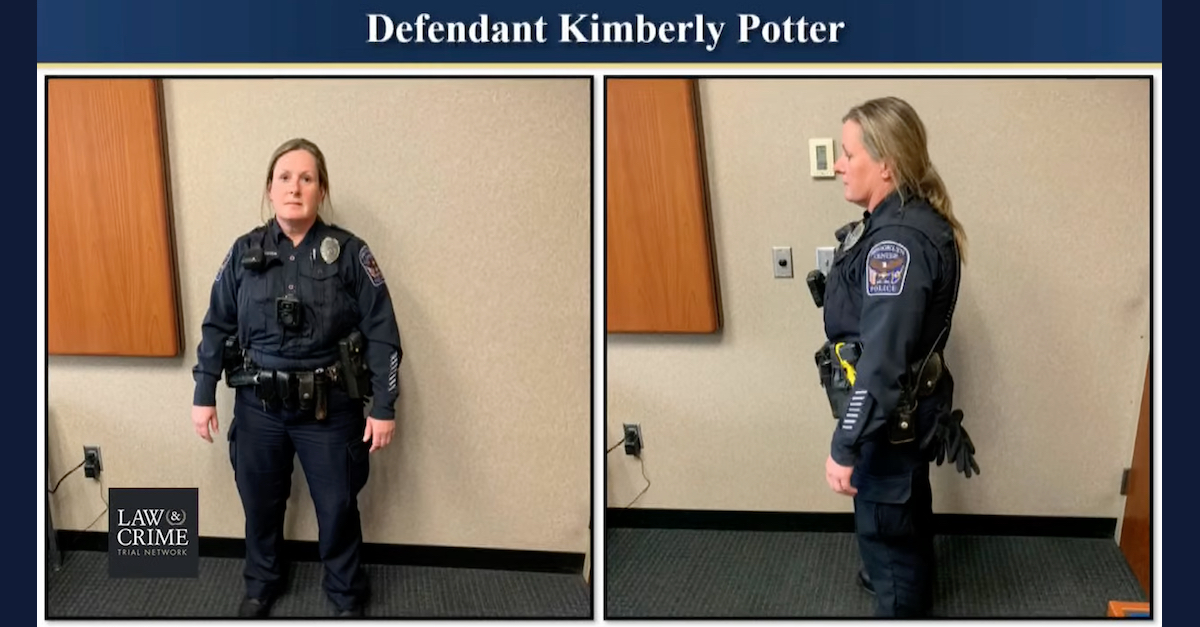
Two images show Kimberly Potter wearing her service belt. (Image via a slide used during prosecution opening statements.)
Potter again became emotional; the judge agreed to an extended break before prosecutors resumed.
Potter then testified she didn’t remember telling a doctor that she recalled seeing her gun in her right hand before she shot Wright.
“I was distraught,” Potter said of her memory lapse. “I wasn’t in a good place.”
Prosecutors then methodically attacked Potter’s specific actions. Here’s some of the back-and-forth questioning:
PROSECUTOR: “After you shot Daunte Wright, you didn’t behave like someone who had just saved Sgt. Johnson’s life, did you?”
POTTER: “I was very distraught; I had just shot somebody. I’d never done that.”
Well, you never asked Sgt. Johnson if he was okay, right?
I don’t remember the conversations.
You didn’t check in on him at all, right?
I don’t know.
Well, you saw the video. When Sgt. Johnson fed you the line, ‘That guy was trying to take off with me,’ you didn’t bite, right? You didn’t respond to that at all, did you?
I was crying. I was in shock.
He was trying to make you feel better?
The defense objected; the judge sustained the objection.
The prosecutor, Erin Eldridge, then noted that neither Johnson nor Wright seem to remember the alleged feeding of the line — despite it being caught on bodycam video. Eldridge then forced Potter to acknowledge that she didn’t exclaim anything about saving Johnson’s life, didn’t render aid to Johnson, and didn’t render aid to Wright.
PROSECUTOR: “You didn’t do any of those things on April 11, did you?”
POTTER: “No.”
You stopped doing your job completely. You didn’t communicate what happened over the radio, right?
No.
You didn’t make sure any officers knew what you had just done, right?
No.
You didn’t run down the street and try to save Daunte Wright’s life, did you?
No.
You didn’t check on the other car that had been hit, did you?
No.
That all happened just down the road from you.
Yes.
You had focused on what you had done, because you had just killed somebody?
“I’m sorry it happened,” a shaking and sobbing Potter blurted out from the witness stand. “I’m so sorry.”
Potter was initially charged with second-degree manslaughter. Prosecutors later added a count of first-degree manslaughter to the case against the former officer.
[Editor’s note: this piece has been updated to include additional testimony.]